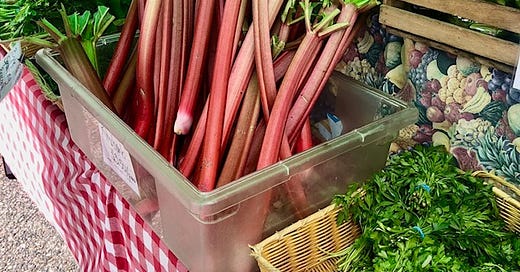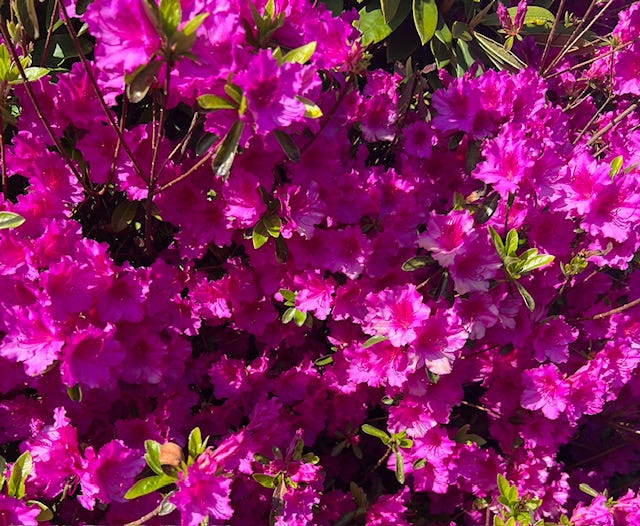Hello!
The rhubarb and asparagus are at the farmer’s market, I smell lilacs everywhere I turn, and the birds are chirping well into dusk—which can mean only one thing: we are firmly, resolutely in spring’s grasp. Lucky us. I will never tire of watching the world bloom every year, and I will never not be delighted by the seasonal changes I notice around me.
The same way people get excited about a new album or TV show, I get excited about the way the air smells softer in spring, the way otherworldly colors appear so briefly yet brilliantly, and the way the sun’s rays now linger longer and warmer through the window. I don’t ever want to lose my childlike sense of wonder, but I especially don’t want to lose it when it comes to witnessing the changing of the seasons. I am so grateful for the way it stops me in my tracks.
I’m very happy to be here today—here as in writing Second Breakfast in a sunny chair by the window but also here as in taking up valuable real estate in your inbox, given that neither I, nor this newsletter, has been in either of those places in a month. Not that I didn’t want to be, but April kicked my ass, so I couldn’t be.
In an entirely unsurprising, yet still jarring turn of events, it turns out that balancing an intense new writing job, finding time (and brain space) to write for fun, and engaging in other activities necessary to functioning—you know, sleeping, eating, socializing, and caring for your mental and physical health—is actually quite hard to do all at once. I knew things were bad when I woke up with mysterious swelling and pain in both eyes and learned that I, quite literally, worked myself into a state of extreme eyeball inflammation that only some rare steroid eyedrops will fix. Love that for me!1
So, something had to give. And what gave was this newsletter (and maybe a sliver of my sanity). What a tragic irony that we ditch our hobbies when we’re overstretched, when they’re probably the very things we need most to reclaim some sense of peace during life’s hectic chapters.
But since I am someone who tends to do the most—evidently to the point of inflamed eyeballs—I really needed to do less last month. As the events of my own life ebb and flow, so too will the cadence and contents of this newsletter. And that’s the fun of it all: I can take my art in whichever direction I want, even if it’s toward the metaphorical parking lot. Thanks for hanging around while I took a break.
One of the things I always try and make time for—sometimes more so than exercising or cooking a meal or watching movies or hanging out with friends—is reading.
It’s both a balm and a teacher on any given day, comforting me and challenging me, sometimes both at the same time. I love seeing the way other writers describe something, whether it’s something I’m familiar with or not. I’m constantly amazed by the millions of ways you can say the same thing, and by the way someone can describe something simple so beautifully that it takes your breath right out of you, because you viscerally recognize the feeling it captures.
This happened recently while I was reading To The Lighthouse by Virginia Woolf, a book that’s famous for the way it shows “the small joys and quiet tragedies of everyday life.”
The plot follows the Ramsay family, who live off the rocky coast of Scotland in the early 1900s, and this specific passage comes at the end of a stunning scene where Mrs. Ramsay (the matriarch) has just hosted a chaotic yet blissful dinner party for her husband, children, and a slew of guests. Let me set the scene:
At the beginning of the dinner party, Mrs. Ramsay was questioning everything she’s done in life and believes herself to be responsible for the lack of beauty and isolation around her. Her husband is being rude, her children are late, and the guests are arguing, and she feels it’s her duty to salvage everything and everyone. The weight of the world is on her shoulders in a way that’s unique to being a woman in the 1900s, but in a way that so many women may resonate with today.
As the candles are lit for dinner against the backdrop of chaotic conversation inside and a stormy sea outside, the mood in the room changes, and the guests begin to interact in harmony, seemingly uniting against the uncertainty, literally and metaphorically, all around them. As this happens, Mrs. Ramsey’s distress melts away and she begins to see all the beauty before her—in her children, who she knows will soon grow older without her; in her husband, who is eternally unpleased yet stoically doting; and in her dysfunctional yet intelligent guests, who are all just trying to find their place in the world. As the dinner concludes and as her husband recites a poem to their guests as a tribute to his hostess, Mrs. Ramsay gets up from the table and turns, wistfully, to look back at all of them:
“With her foot on the threshold she waited a moment longer in a scene that was vanishing even as she looked, and then, as she moved…and left the room, it changed, it shaped itself differently; it had become, she knew, giving one last look at it over her shoulder, already the past.”
Whew.
I feel like that passage so beautifully captures the fleeting nature of the moments we experience with the people around us. It made me think how many times I’ve been in a moment, looking around me and not wanting it to end because it’s so special and unique and I know I may never experience it the same way again, if at all. In times like those, I want to grab those feelings out of thin air and store them in a bottle for safe keeping so I can revisit them when I want or need to. I’m always worried I’ll forget them.
The amount of times I’ve spent holidays around the dinner table with my family, seeing us grow older before my eyes; the amount of times I’ve looked back at my parent’s house as I drive to the airport to go back to where I live; the amount of times I’ve observed my dearest friends, laughing and joking and shining as their truest selves; the amount of times I’ve gazed at my grandparents in their cozy homes, searing moments with them into my memory to keep me company when they’re no longer here, and now, most of them no longer are here; the amount of times I’ve smelled the spring lilacs and felt wistful for their short life; the amount of times I’ve realized this is probably the last time I’ll ever see a certain place or spend time with this person or eat this specific food again.
The number of times I’ve had a Mrs.-Ramsey-on-the-threshold moment, looking back and realizing something is already in the past, is too many to count. I’m sure I’m not alone in that. It is all so fleeting. But I guess that’s part of what makes the human experience so incredible and beautiful and heartbreaking at the same time.
I am deeply grateful for those moments, but just like the ephemeral spring blooms, sometimes I wish I could bask in them for just a bit longer.
Have you had a moment like this recently?
Hope you take a moment to soak in everything around you this week.
Until next time,
Elizabeth
No, it’s not allergies. Yes, this happened even when wearing blue light glasses, using lubricating eye drops, and not looking at screens after work. If you, like me, stare into a computer all day for work, apparently we’re supposed to be resting our eyes at least 5-10 minutes out of every hour. Would love to know if ANYONE been successful in doing that…







I felt that way just yesterday "the fleeting nature of the moments we experience with the people around us. It made me think how many times I’ve been in a moment, looking around me and not wanting it to end because it’s so special and unique and I know I may never experience it the same way again, if at all. In times like those, I want to grab those feelings out of thin air and store them in a bottle for safe keeping so I can revisit them when I want or need to. I’m always worried I’ll forget them."
Such an insightful and well-done appreciation of seasonal change (and an excellent summary of the Woolf novel)! My own favorite transition is that from summer to autumn -- and then to the deep autumn of late November and early December.